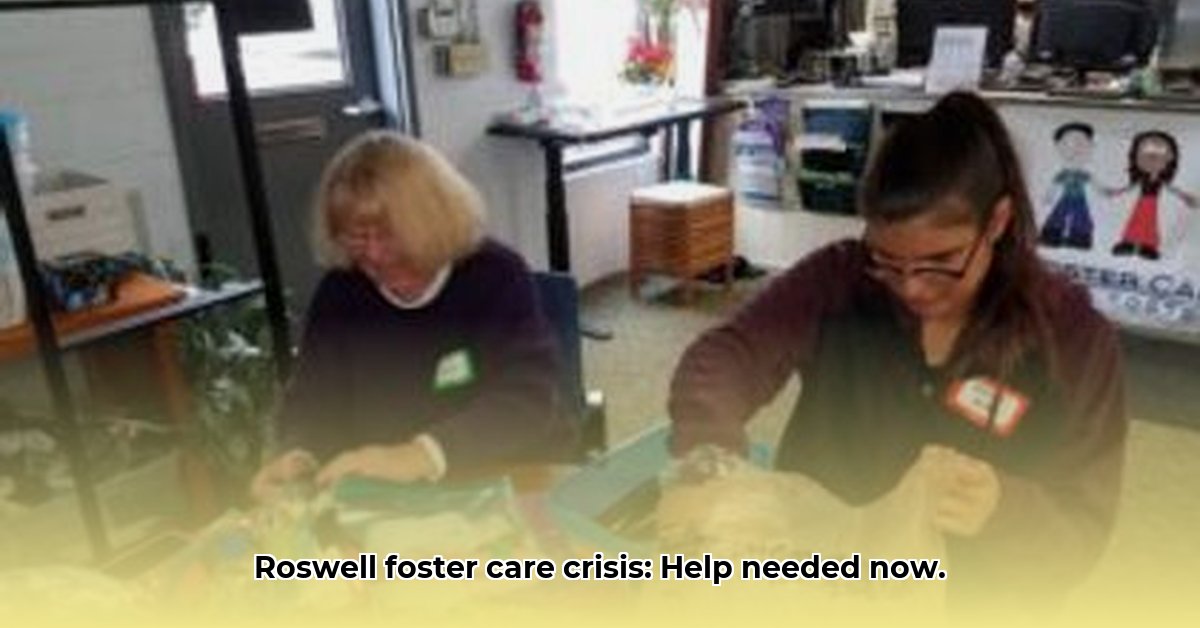
The Hidden Crisis in Our Community
Imagine a child abruptly separated from their parents, their world turned upside down. This isn't uncommon in Roswell, Georgia, and across the state. Thousands of children find themselves in the care of relatives—grandparents, aunts, uncles—often without adequate support. While we often focus on children in formal foster homes, many children navigate the challenging landscape of kinship care. These families frequently face significant financial and emotional strain, mirroring the struggles of those caring for children officially in foster care. This often-overlooked situation is a hidden crisis impacting Roswell families, demanding our attention and resources.
The Real Numbers: Understanding the Depth of the Problem in Roswell
Official Georgia foster care statistics likely represent only a fraction of the true picture. These numbers fail to capture the significant number of children residing in kinship care arrangements. Consider it an iceberg: the visible tip represents children in formal foster care, while the much larger, submerged portion encompasses the often-unreported kinship care cases. Roswell likely has many more children needing assistance than official figures suggest. This data deficiency hinders accurate resource allocation and effective support provision. Ongoing research is striving to improve data collection methods, promising a more accurate understanding of the true scope of the problem in the coming years. This lack of accurate data presents a substantial challenge in properly addressing the needs of these children.
Building a Better Future: Immediate and Long-Term Solutions for Roswell's Children
Addressing this complex issue necessitates a multifaceted strategy incorporating both immediate and long-term solutions. It requires the collaborative efforts of extended families, social workers, government agencies, and community organizations.
Immediate Needs (First Year):
Financial Relief: Many kinship families experience financial burdens. Emergency funds for essential needs like food, housing, and clothing are vital. Childcare subsidies can be particularly impactful for working families. Even small financial aids can make a significant difference.
Connecting Resources: Families require assistance navigating support systems. Connecting them to local food banks, healthcare providers, and other crucial services reduces stress and improves children's well-being. A simple referral to a free medical clinic can alleviate substantial burdens on already stressed families.
Skills Training: Workshops and classes focused on child development, parenting strategies, and stress management equip caregivers with invaluable tools. Tailored workshops empower these caregivers to nurture thriving children.
Long-Term Support (3-5 Years and Beyond):
Mentorship and Support Groups: Connecting caregivers with mentors and support groups fosters ongoing encouragement and guidance. Sharing experiences builds community and combats feelings of isolation.
Policy Changes: Advocacy for legal and regulatory changes that ensure stable, long-term funding for kinship caregivers is critical. Consistent support eliminates the concern of losing vital assistance. Dedicated funding streams for kinship care, mirroring those for formal foster care, are often suggested by experts.
Streamlined Transitions: Children may transition between kinship care and formal foster care. Efficient systems minimizing disruption are crucial. Best practices for coordinating these transitions are a focus of ongoing discussions among child welfare professionals.
Working Together: Actionable Steps for Everyone
The following table details actionable steps for different stakeholders:
| Stakeholder | Short-Term Actions | Long-Term Actions |
|---|---|---|
| Extended Family Caregivers | Seek available financial and resource assistance; actively participate in offered workshops. | Join support groups; advocate for policies supporting kinship families; share experiences to raise awareness. |
| Foster Care Agencies in Roswell | Strengthen partnerships with kinship care organizations; improve data collection methods. | Develop comprehensive transition plans for children; explore sustainable funding models; offer specialized training. |
| Government Agencies (City/State) | Allocate more resources towards kinship care support; fund research into its effectiveness. | Implement policies to provide consistent support; create standardized training for kinship caregivers; streamline processes. |
| Non-profit Organizations | Expand existing kinship care programs; build partnerships with government agencies and businesses. | Secure ongoing funding; advocate for better policy and resource allocation; raise public awareness about the issue. |
Investing in Roswell's Future: A Call to Action
The challenges are significant, but the potential for positive change is substantial. Improving the lives of children in kinship care in Roswell demands a unified effort. Consider volunteering time, donating to supporting organizations, or advocating for better policies. Every contribution matters. Let's build a brighter future for Roswell's most vulnerable children.
How to Access Financial Aid for Kinship Caregivers in Georgia
Key Takeaways:
- Georgia's kinship care system requires increased resources.
- Caregivers face considerable financial burdens.
- Multiple avenues exist for obtaining financial assistance.
- Navigating this system necessitates persistence and advocacy.
- Long-term solutions demand elevated funding and systemic improvements.
The Weight of Kinship Care in Roswell
Consider Aunt Susan, a Roswell resident, suddenly raising her niece and nephew after a family crisis. She loves them, but the financial strain is significant. This illustrates the challenge many kinship caregivers face in Georgia, often sacrificing financial stability for the well-being of children in their care. This highlights a critical need: readily available financial aid. However, accessing this aid can be complex.
Finding Financial Assistance
TANF (Temporary Assistance for Needy Families): This federal program offers cash assistance to low-income families. Eligibility varies.
Child Care Subsidies: Georgia provides subsidies to assist families with childcare costs, subject to income limits.
Direct Financial Assistance from DFCS (Department of Family and Children Services): Some DFCS offices may offer direct aid; inquire at your local office.
Nonprofit Organizations: Numerous Roswell and surrounding area nonprofits offer support services, including financial help, to kinship caregivers.
Legal Aid: Legal aid organizations can assist with guardianship and related legal processes.
Systemic Solutions
Short-term goals involve improving access to existing programs. Simplifying applications, expanding outreach, and raising financial aid amounts are crucial steps. Long-term success demands systemic change, including increased state funding, enhanced caregiver training, and a greater focus on preventative services.
The Urgent Need for Change
The challenges facing kinship caregivers are substantial and widespread. They deserve our full support. Through advocacy, donations, and raising awareness, we can build a stronger support network. Let's work towards lasting solutions. https://dhs.georgia.gov/kinship-care-portal